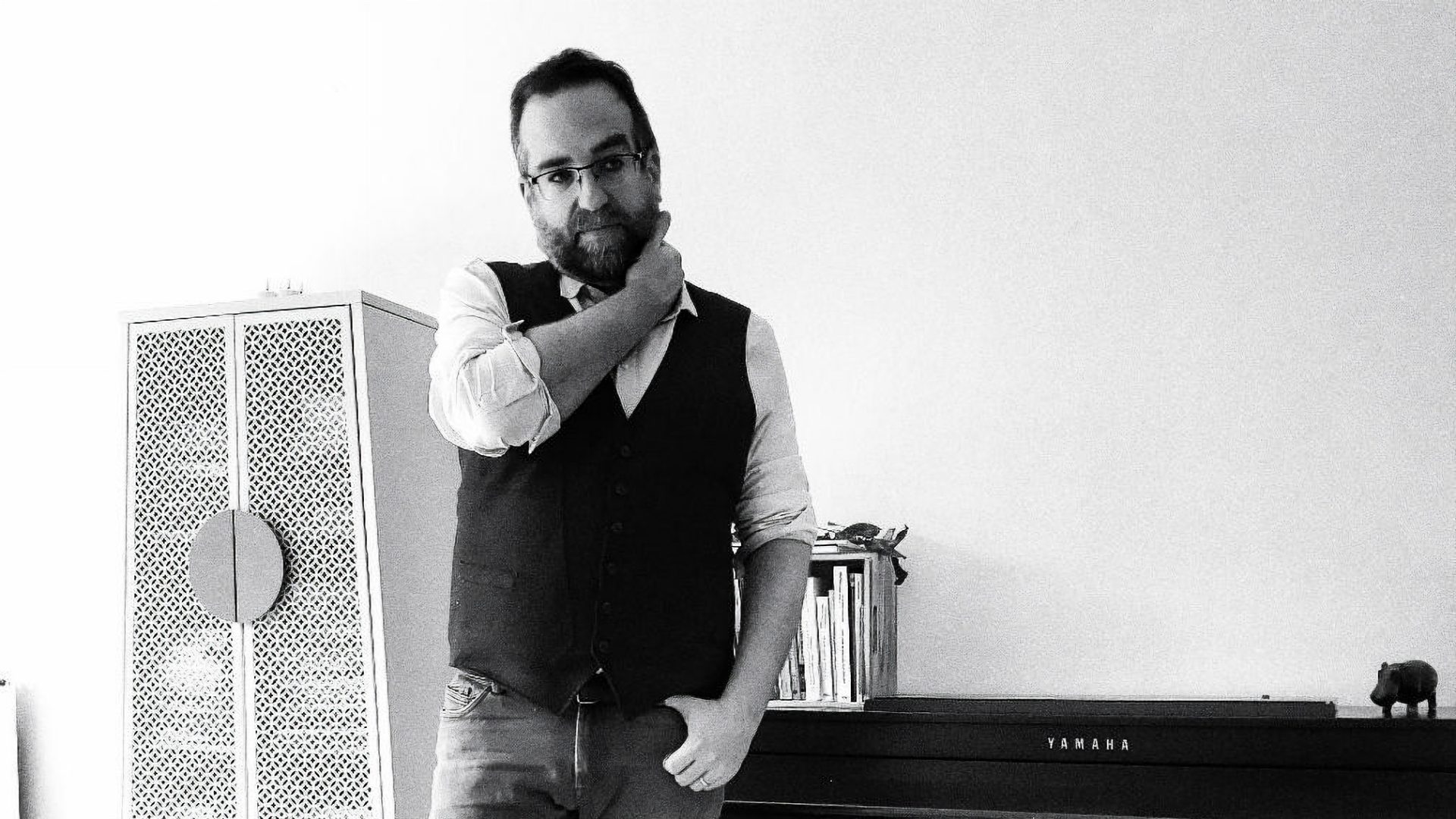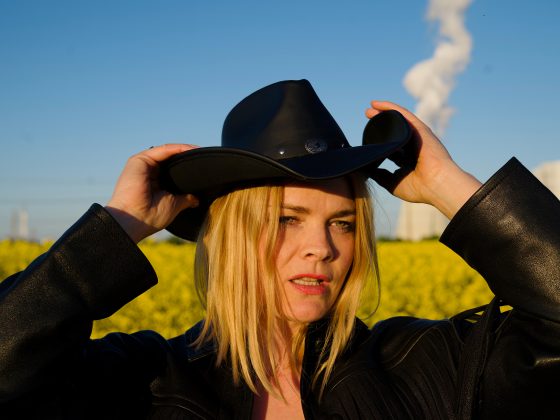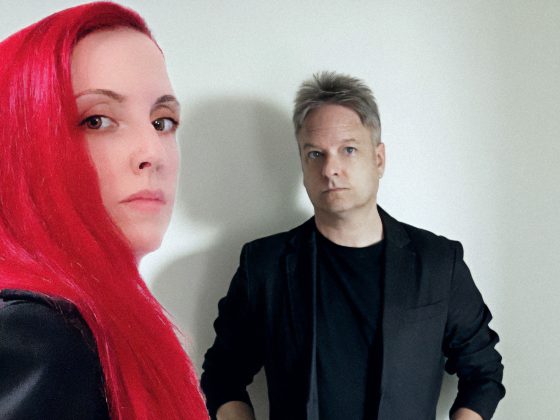A burning paradise for the gods of war
The White House is now a dark star
Empires are back with a sinister smile
Resistance is the only way out
Albin Wagener’s music now glides through Caen’s fog-laden streets under the banner of The Memory of Snow, his evocative solo rebirth after the dissolution of Overcast. A decade of creative hibernation thawed on a journey to Finland’s austere, boreal north, where he rediscovered purpose amid Arctic hush and endless white horizons.
“For me, the name ‘The Memory Of Snow’ is connected to three things,” Wagener says. “First, a magical, serene, and very impactful moment I experienced in Finland in 2018, where I traveled up to the Arctic Circle, getting lost in the snowy landscapes. I felt a sense of fulfillment I had never experienced before. It’s also a memory from my childhood, when winters were still snowy, and I loved the sensations it brought: the silence, the calm… something that made it feel like being outside of time, in a way. And finally, it’s also a reference to the climate crisis, with the risk of losing this snow in many places. So it’s something very personal, and I think it also reflects the style of music I create.
Wagener fans his influences like a fortune-teller’s tarot deck, each card tinting the next—Depeche Mode’s icy synth thrum, Slowdive’s iridescent haze, and The Chameleons’ glass-cut angles. Out of that spread rise songs steeped in yearning, where post-punk frost dissolves into dream-pop vapor, then catches a hint of twilight blues. The full tableau unveils itself on his 13-track album, Obsidian Dust.
The album opens strong with “So Many Buildings Close to the Sea,” a track that hovers over a sun-soaked city filled with longing. Wagener channels something akin to Frank Tovey’s folk intensity alongside Morricone-esque synth riffs, capturing fleeting romances amidst concrete jungles and transient human connections. His voice floats softly yet sharply, vividly illustrating the theme of impermanence, much like the inevitable retreat of summer.
The raw nerve of Betrayed confronts personal devastation without embellishment, reminiscent of The Church’s melancholy hymns and early U2’s earnest intensity. Wagener’s honesty is brutal, dissecting familial wounds and emotional treachery, exposing despair that teeters on oblivion’s edge. Dark Star ignites fiercely, a clarion call against creeping fascism and ecological decay. Wagener’s vocal condemnation blazes over dark synths, conjuring imagery of obsidian dust and societal collapse, urging resistance against authoritarian tides with urgency and conviction.
Please Me twists the night into an urgent plea for sensual escape. Its distorted vocals and heated guitar licks blur the boundaries between emotional pain and raw, visceral release, capturing intimacy as a primal refuge from daily monotony and internal strife. Viper coils seductively, venomous love framed as addiction and self-destruction. Violent metaphors snake through lush instrumentation, depicting romantic turmoil as an alluring yet ruinous trap, leaving scars of guilt and internal blame.
Warm Rain simmers anxiously, nocturnal tension dripping through urban solitude. Wagener’s uneasy imagery and spectral instrumentation channel sleeplessness and suppressed violence, articulating city life’s hidden restlessness. A shift occurs in Prince of Asturias, where upbeat rhythms and lush strings celebrate authenticity and inner clarity. References to Leonard Cohen reinforce the song’s call to embrace genuine creativity and purposeful self-awareness, illuminating personal truth as a path toward hope.
The Cold Birth of Despair is a slow descent into existential twilight, draped in celestial chorals and Lynchian blues. Wagener’s plaintive synth pads underscore life’s inevitable void, portraying death as both profound and profoundly isolating. Ghost City traverses empty streets haunted by regret and societal scars. Humanity’s destructive impulse contrasts sharply against nature’s tranquil persistence, suggesting serenity might bloom only after humankind’s departure.
What’s Left Of A Man depicts emotional ruin and resignation. Addiction and past betrayals cloud the narrator’s weary reflection, leaving only husks of self amid life’s absurd repetitions. Meanwhile, Dakota Skye offers a poignant critique of fame’s hollow promise, using its tragic muse to condemn society’s exploitative contradictions. Wagener mourns the discarded idols, caught in celebrity’s isolating glare.
Blast From The Past revisits nostalgia with aching honesty, admitting past failings and acknowledging memories that stubbornly refuse oblivion. Love’s ghostly persistence is accepted without romanticizing its enduring sting. Finally, Destination embraces life’s stark limits, finding beauty amid inevitable decay. Wagener’s resignation is tender, comfort found in simple moments against existential resignation, questioning purpose while savoring transient joys.
Wagener’s The Memory of Snow is a compelling journey through the emotional wilderness, a reflective embrace of isolation, despair, and fragile hope, offering solace amidst life’s beautiful decay.
Listen to Obsidian Dust below and order the album here.
Albin Wagener spoke with Post-Punk.com about the creation of the album, his influences, and the subject material in his poignant lyrics.
Obsidian Dust is your third album, and it’s been noted as something of a creative milestone in your career. How do you feel your musical identity or approach has evolved on this record compared to your previous releases? Were there any new influences or challenges you embraced during the creation of Obsidian Dust that set it apart from your earlier work?
It’s been an incredible journey actually, since I started making music again in 2022, after a ten-year long writer’s block. Basically, I needed to tread carefully regarding music and get used to it again in a way. My first album, Home is where the heart aches, reflects this: it’s based on a mix of new and old ideas. The second album Atlantic is a bit more conceptual, still a mix of ideas, but I felt more confident about making music and writing more straightforward tracks, in order to build a musical world of my own. It still feels like some work in progress when I listen to the songs, but it’s getting somewhere. Strangely, Obsidian Dust wasn’t meant to happen: I was starting to work on a mirror album to Bowie’s Outside (which is now 30 years old), titled Inside (and which I hope to release by the end of 2025), and somehow I started playing with more atmospheric sounds. All in all, a specific artistic vision to emerge of all this: the aim of my music was to mix electronic elements with eerie soundscapes and some southern gothic feeling. In this sense, Obsidian Dust is a work on its own, more cohesive… it’s been compared to Depeche Mode, Nick Cave and Swans, so I guess I can be pretty proud about this work. The influences remain the same, but they are finally combined in something that is much more personal. I feel like I didn’t need to copy or write tracks that would ultimately say “this one is officially inspired by this band or that band”, but just make my stuff, write songs, experiment with sounds and that’s that. Obsidian Dust is a happy accident, it emerged as a full body of songs.
Reviewers have described Obsidian Dust as “darker, denser and heavier” than your earlier albums, blending elements of coldwave, post-punk, dream pop, and even “Lynchian” soundscapes into an immersive sonic journey. What was your approach to crafting the album’s rich sound palette and instrumentation to achieve this mix of electronic textures, gothic guitar tones, and deep melancholy? Did you experiment with any new instruments or production techniques to develop the album’s distinctive atmosphere?
I guess I just drifted away from classic songwriting and just wanted to experiment with sounds. Sometimes I would just turn on the computer, choose a sound and start playing around with it-this is how the songs Warm Rain or The Cold Birth of Despair ended up being full fledged songs. But at the same time, the more I played with this dirty southern guitar sound and the atmospheric synths, the more I knew where I wanted to go: I needed Obsidian Dust to be the sound of dusty summer evenings, when it’s too hot, when the day’s been to dark and storms are about to burst. In this sense, it’s a summer album-but not the kind of classic summer albums where it’s all about positive vibes and dancing and stuff. It’s a goth summer album: it’s dark, sticky, uncertain and rusty. This is probably where The Memory Of Snow is probably going, ironically (when you think of the name of my musical project). I guess I had a few influences in mind, like some tracks by Peter Murphy or The The for instance, and of course David Lynch’s works, in order to recreate this strange atmosphere where everything feels like it’s slowly decaying because of the heat. It’s like a feverish nightmare in the middle of a hot summer night.
You recorded, mixed, and mastered Obsidian Dust yourself at Brkfst Studio in Lille. What was the recording process like when you handle every aspect of production on your own? Did working in your personal studio give you more freedom to experiment or refine each track’s sound? And were there any challenges (or advantages) in being responsible for the entire production process from start to finish?
Since I began making music again in 2022, I started a very intimate journey. I had to get intimate again with keyboards, with the sound of my own voice, with production techniques and stuff. I started working on mixing and mastering, watching tons of videos, experimenting, going back and forth because I wasn’t always satisfied with the result, etc. It was about learning to be a musician again, so I wanted to be in full control… well it’s more about artistic empowerment than control actually. It’s about finding my own vision, and since I was on the verge of beginning a new chapter of my musical life after such a long hiatus, I wanted to mix and master those songs. I want to be in charge of the result, I needed to feel like I was the only one responsible for the outcome, even if it wasn’t as good as I thought it would be. So yes, it’s also about experimenting: I mean when you’re on your own and you start mixing, you can always go back to your song and change a few things if you feel like something is missing in your sound. When you work with other people and you’re in the mixing process, well you spend your money on mixing and you can’t go back… or if you go back, you need to do it all over again. It’s also less expensive of course, and it’s more rewarding to feel like you’re learning and becoming a better artist, somehow.
The album’s title, Obsidian Dust, is quite evocative – and it even appears in the lyrics of “Dark Star.” What does “obsidian dust” signify for you in the context of this record? Is there a story or concept behind how you chose that title, and how do you feel it ties into the album’s overall themes or mood?
To be completely honest, the working title was Obsidian. I was feeling like I was working on a dark album, so I wanted a title that would reflect it. But at the same time, there was also this filthy and sticky atmosphere, where you feel like you’re working with things that are falling apart, decaying and still sticky. So I felt that Obsidian Dust was a better title for the album, because it would reflect its atmosphere-like a musical movie, if you prefer. It’s funny that you mention those lyrics, because Dark Star is quite an apocalyptic song-it’s really a political anthem about the end of democracies, about the craziness of our times, especially with Musk and Trump’s alliance and the way it just hit the world. So I liked the idea of this contrast between ‘obsidian dust’ and ‘the memory of snow’, especially because the name of my musical project is about childhood memories and my love for the snow and the peace it brings me. This idea of a darkness that is devouring everything like a black hole, tearing everything apart, and just swallowing a form of innocence that is now definitely gone. I’m sorry, it’s not a very positive or funny album! But I believe it’s the only honest music I can make.
The songs on Obsidian Dust span both deeply personal and broadly political subject matter – from personal betrayal and desire to the “authoritarian zeitgeist” of our times, meditations on mortality, a pandemic-induced standstill, and even a tribute to Leonard Cohen. How did you manage to balance these diverse themes within one album? When writing, did you approach the intimate, emotional songs differently than the more outward-looking tracks that tackle social and existential issues?
I’ve always thought that music is a politic thing-and art in general. Postpunk is about mixing intimate existence with political topics, when you take a look at the lyrics of The Sound, Joy Division, Comsat Angels or Eyeless In Gaza for instance. And the whole purpose of the alternative musical scene since the beginnings, since punk and postpunk, is to question the way we live, the absurdity of our existence, love in dark times and the way society works. So in a sense, it’s very political, even when it speaks to your soul. Even if the topics since to be quite diverse in terms of songwriting, they all try to connect the intimate with the political or with society if you prefer. Even bigger topics like those approached in Dark Star and Ghost City affect our lives: the way a pandemic has put our lives and our societies on hold, or the way these new political era completely destroys our sense of safeness and security. Home is where the heart aches, right? It’s also about trying to find comfort in references, in love, lust and journeys. This is also why the album ends with Destination, a track about the end of a journey… which does not mean that eveything is coming to an end, but that a chapter is closed.
“Ghost City” addresses the eerie stillness of a world in lockdown — the “pandemic-induced standstill” that you depict in the song. What inspired you to write about that lockdown atmosphere, and how did you translate the feelings of isolation and tension into the music? Were there specific instrumentation or production choices you made to evoke the emptiness of streets and the tension of that period in “Ghost City”?
During the pandemic, I was driving through the city to buy some food, and everything was so still and peaceful… but it felt like the end of human society somehow. It was frightening and relieving at the same time, it’s like being liberated from the stress and the constraints of daily life. Yet it was also creating something that was pretty much dystopian in a way, with democratic regimes imposing rules that were not democratic at all, and people locked in their own homes. So I had these lyrics written around 2020, there just waiting for the right musical atmosphere. And while making the album, I also listened to some old Sisters Of Mercy, and to be honest I just felt like it would be interesting to write some music that would bring some kind of post-apocalyptic soundscapes to the lyrics, with a thumping rhythm section and something that would be more dynamic, in contrast with the stillness of the Covid lockdown. In my songs, there’s always this kind of strange contrast between deep sadness I think, and the fact that the only way out is to hope that things can get better. It’s about being aware of this whole absurdity, yet being able to work for these tiny lights. I guess Ghost City works that way; there’s still energy in bleakness.
“Dark Star” is one of the more politically charged tracks on the album, confronting what you’ve called an “autoritären Zeitgeist” (authoritarian zeitgeist). The lyrics reference rising fascism and disinformation, even declaring “The White House is now a dark star… The memory of snow is now obsidian dust. What sparked the creation of this song, and how did you go about conveying its urgent, ominous message through the music and arrangement? Did writing “Dark Star” influence the overall concept or the title of the album in any way?
…Even If I don’t live in the USA, I knew that a second mandate by Trump would have disastrous consequences for the world as we know it-well at least as we know it in western democracies, because we forgot what chaos is like, and we probably were too much confident about our societies and the way they are working. But somehow it’s not about Trump himself: it’s more about watching safe democracies falling apart, slowly decaying, tumbling down and drifting into a whole new territory where inequalities are about to become violent, where people cannot speak with each other anymore even when they disagree. Democracy is about being able to disagree peacefully, and discuss these disagreements without engaging into civil wars. This time appears to be gone now. But Dark Star is just one song among others on the album, yet it’s probably one of the most aggressive and raw tracks, definitely. It has this industrial touch which makes me want to experiment more in this sense in the future, to be honest.
“Prince of Asturias” serves as a poetic nod to Leonard Cohen – it’s noted as a tribute that even quotes Cohen’s famous remark, “If we knew where the good songs came from, we’d go there more often”. Why did you choose to incorporate that reference into this song? What significance does Leonard Cohen or that particular quote have for you, and how did it influence the mood or message of “Prince of Asturias” in terms of songwriting or sound?
Again, it’s a dark summer album, so it made me think of this video I saw, when Leonard Cohen was granted the Prince of Asturias award for Literature in 2011. And it’s probably the most beautiful speech I know to be honest. To see this old man, all gloomy and soft at the same time, trying to share his humble thoughts on life and songwriting… I mean it’s a beautiful testimony when you consider his body of work. In this sense, Prince of Asturias tries to reflect his. It’s a softer song, a bit nostalgic and melancholic of course, but it’s more contemplative, trying to reconnect with the meaning of songwriting and how it can serve us all when we have to face the difficulties and nightmares of our lives. It’s about finding beauty and relief in the simple things. In this sense, this song is probably one of the rare beacons of light in Obsidian Dust. And I love how it actually says so much about the mysteries of songwriting by just quoting Cohen.
“Dakota Skye” stands out for its storytelling; the lyrics hint at a real-life narrative with lines like “They said a pornstar saved America / But did America save a pornstar” What inspired you to write this song and the story of “Dakota Skye”? How did you approach capturing the emotional weight of that story in the music and performance, and what do you hope listeners connect with or take away from this track?
Actually, this one is interesting because I got bad comments about it. It’s about this adult pornstar who called herself Dakota Skye and who died from an overdose at the age of 27. It’s a classic tragic american tale to be honest. Her real name was Lauren Kaye Scott, and I don’t know why but I got touched by this story… it says so much about the American dream, which in reality looks a lot more like an American nightmare sometimes. And yeah as I said, I got bad comments; people wrote me telling me this shouldn’t be released as a single, that I shouldn’t write a song about a pornstar… this really surprised me to be honest. We’re in 2025, a lot of tracks have been written about pornstars especially since the 90’s (I’m thinking of the Manic Street Preachers’ Little Baby Nothing about Traci Lords), and there’s this whole intriguing thing about porn. Everybody knows about it, of course noone watches it, and there’s this whole ongoing debate about the way this industry can empower or exploit women, and the feminist take of Onlyfans for instance. In the end, it’s about getting past it all and looking about human beings trying to make it through life, whatever their choices, however tragic they may be. It’s about respect in some way.
The track “Betrayed” vividly conveys the agony of personal betrayal (with lyrics about “the taste of blood in your mouth” and how pain “always come from the beloved ones”. How did you channel those intense emotions into the song’s musical arrangement and vocal delivery? For example, did you use any particular instrumentation, effects, or songwriting techniques on “Betrayed” to make sure the listener feels the rawness and vulnerability behind the lyrics?
Betrayed is a very, very personal song. During these last few years, I experimented a lot of relational violence from family and close friends who are not friends anymore. These have been tough times, really. I felt like I’ve been betrayed by close ones, and honestly if it weren’t for my kids and my wife, I probably would have make very, very bad choices at the time. It’s still fresh, all these things happened in a very short period of time and it’s been very, very violent. That’s all I can say. Betrayed is about finally getting this out of my system, and I wanted a track that was balancing sadness with rage, which you can feel with the guitar… sometimes it’s just playing away, and all of a sudden it’s about overdrive and saturation. It’s about letting this anger explode in a song, because ultimately I couldn’t let it explode in the face of these people. This is also why we have music: it prevents from hurting people when you get hurt so hard that you feel like your whole world is crumbling down. I’ve suffered a lot, and I’m happy that it’s all over now. I won’t forget what happened, but at least I’m over it. But I needed to get it out of my system: this is why I needed Betrayed, with its balance of rawness and vulnerability. It feels good to wear your heart on your sleeve, finally, when you just kept it all to yourself for so long because you didn’t want to hurt back those who hurt you. I guess some readers here will be able to relate.
Follow The Memory of Snow:
















 Or via:
Or via: